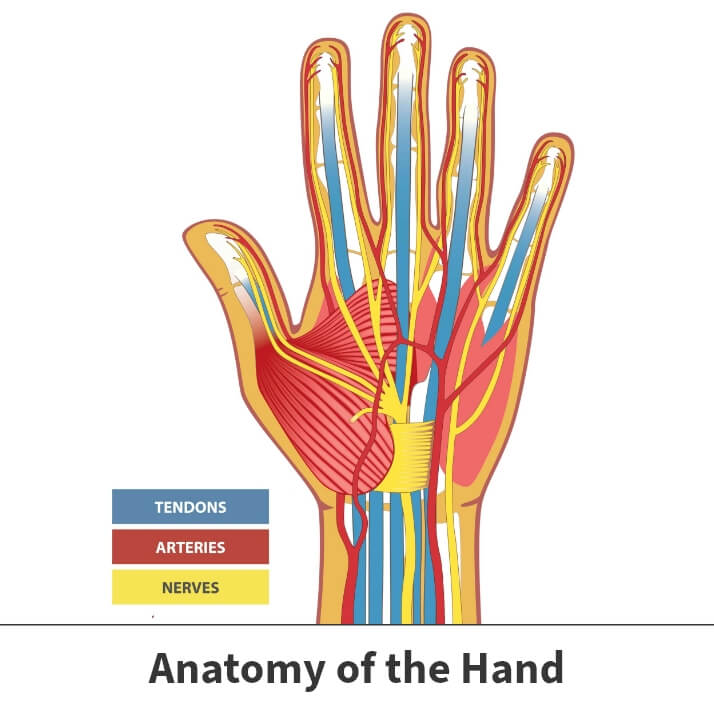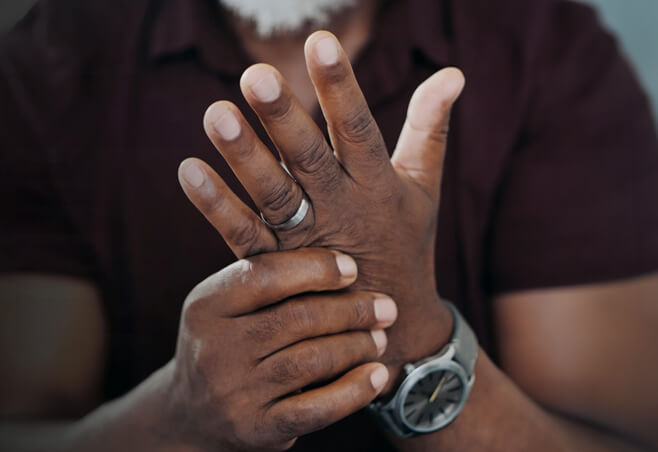Hand revascularization
In most cases, your hands are seen and not heard. Each day you use your hands to perform numerous tasks, large and small. When they are healthy and functioning, you often take them for granted. However, should you experience pain or any other type of potentially debilitating problem, your life could prove far more challenging.
Anatomy

Your hands are made up of several components, such as bones, muscles, and soft tissues. That said, the organs contain important internal structures known as blood vessels, such as arteries and veins. These channel-like tubes are responsible for carrying blood to and from the heart and nourishing the components that enable your hands to move and execute actions, like, grasping, ripping, and lifting items.
Occasionally, blood vessels might experience injury or damage. If such conditions are serious enough, proper circulation is disrupted, and your hands do not receive adequate blood supply. This is a serious health issue requiring specialized treatment. Fortunately, if these circumstances ever apply to you, a procedure known as hand revascularization might prove beneficial.
About
During hand revascularization, a skilled and experienced hand surgeon repairs damaged or injured blood vessels. The goal of the surgery is to fix damaged tissue and restore blood flow to as normal a level as possible.
Causes of blood vessel damage
A variety of factors can cause blood vessel damage. Injured hand blood vessels are often the result of a traumatic event, such as an automobile accident or a fall. These occurrences can result in serious emergencies, including torn blood vessels that need immediate repair. Significant damage to surrounding structures, like, bones, muscles, and soft tissues may ultimately impact nearby blood vessels.
Certain diseases also often lead to blood vessel damage. Issues, such as infections or immune system disorders, produce a condition known as inflammation. This problem typically causes the blood-carrying tubes to swell. Should you experience significant swelling, vessel walls can sustain damage. Moreover, illnesses like cancer can eat away at blood vessels as they advance.
Another vessel-damaging issue is high blood pressure. This condition places significant stress on blood-transporting channels and over time can lead to potentially serious damage.
Another problem common to blood vessels is obstruction. Obstruction, known also as blockage, occurs when some type of object or substance accumulates in large enough quantities to prevent normal blood flow.
Typically, blockages in blood vessels are caused by the buildup of a substance known as plaque. Plaque is made up of cholesterol and other potentially harmful bodily by-products. It is hard and sticky and attaches to vessel walls. If left unchecked, a buildup of plaque can eventually result in partial or complete blood flow interruption.
In many cases, elevated levels of plaque are the result of lifestyle choices, such as a poor diet and lack of exercise. However, if you have a family member with a history of high cholesterol, heart, or blood vessel diseases, you may also be at an increased risk of developing this condition.
Symptoms
Symptoms of injured hand blood vessels vary depending upon the specific underlying problem and that condition’s severity.
Common indications often include pain, movement difficulties, skin discoloration, in addition to tingling and numbness in the fingers. In the presence of an underlying illness, you might experience events, such as:
- Fever
- Redness
- Skin rashes
- Swelling
- Tiredness
- A general feeling of being unwell
In cases of significant blockages, you might experience issues like coldness in the hands or fingers because adequate blood supply is not reaching the area.

Diagnosis
Your Florida Orthopaedic Institute physician will first perform a thorough physical evaluation where they will likely perform tasks such as:
- Measuring your vital statistics
- Asking about your personal and family’s medical history
- Examining your hand
- Inquiring about your lifestyle or if you had been in a traumatic event
If your doctor suspects blood vessel problems are caused by a disease, you might need blood tests or other diagnostic tools designed to detect specific infections or diseases.
However, if you had experienced recent trauma or display severe symptoms, such as numbness, immobility, severe swelling, or coldness, your physician may order more sophisticated diagnostic procedures. Magnetic Resonance Imaging (also known as MRI scans) or Computerized Tomography (CT images) enable your doctor to capture images of your hand’s inner workings and see damaged blood vessels.
Treatment
There are different types of revascularization and repair procedures. Your surgeon will consider which one is most appropriate for you after considering important factors, such as your age, general health, the specific underlying problem, and the damage’s severity.
Related specialties
- Basal Joint Surgery
- Carpal Tunnel Syndrome
- De Quervain's Tenosynovitis
- Dislocated Finger
- Distal Radius Fracture (Broken Wrist)
- Dupuytren’s Disease
- Flexor Tendonitis
- Fractured Fingers
- Functional Nerve Transfers of the Hand
- Ganglion Cysts
- Hand & Finger Replantation
- Hand Nerve Decompression
- Hand Skin Grafts
- Nerve Pain
- Peripheral Nerve Surgery (Hand) Revision
- Rheumatoid Arthritis of the Hand
- Sports Wrist & Hand Injuries
- Sprained Wrist
- Sudden Acute Finger, Hand & Wrist Injuries
- Targeted Muscle Reinnervation (TMR)
- Tendon Transfers of the Hand
- Thumb Ulnar Collateral Ligament Injuries
- Trigger Finger
- Ulnar Neuritis
- WALANT (Wide Awake Local Anesthesia No Tourniquet)
- Wrist Arthroscopy
- Wrist Fractures
- Wrist Tendonitis
